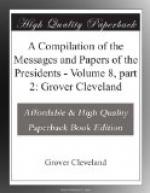A letter from the Emperor of Morocco announces to me his recognition of our treaty made with his father, the late Emperor, and consequently the continuance of peace with that power. With peculiar satisfaction I add that information has been received from an agent deputed on our part to Algiers importing that the terms of the treaty with the Dey and Regency of that country had been adjusted in such a manner as to authorize the expectation of a speedy peace and the restoration of our unfortunate fellow-citizens from a grievous captivity.
The latest advices from our envoy at the Court of Madrid give, moreover, the pleasing information that he had received assurances of a speedy and satisfactory conclusion of his negotiation. While the event depending upon unadjusted particulars can not be regarded as ascertained, it is agreeable to cherish the expectation of an issue which, securing amicably very essential interests of the United States, will at the same time lay the foundation of lasting harmony with a power whose friendship we have uniformly and sincerely desired to cultivate.
Though not before officially disclosed to the House of Representatives, you, gentlemen, are all apprised that a treaty of amity, commerce, and navigation has been negotiated with Great Britain, and that the Senate have advised and consented to its ratification upon a condition which excepts part of one article. Agreeably thereto, and to the best judgment I was able to form of the public interest after full and mature deliberation, I have added my sanction. The result on the part of His Britannic Majesty is unknown. When received, the subject will without delay be placed before Congress.
This interesting summary of our affairs with regard to the foreign powers between whom and the United States controversies have subsisted, and with regard also to those of our Indian neighbors with whom we have been in a state of enmity or misunderstanding, opens a wide field for consoling and gratifying reflections. If by prudence and moderation on every side the extinguishment of all the causes of external discord which have heretofore menaced our tranquillity, on terms compatible with our national rights and honor, shall be the happy result, how firm and how precious a foundation will have been laid for accelerating, maturing, and establishing the prosperity of our country.
Contemplating the internal situation as well as the external relations of the United States, we discover equal cause for contentment and satisfaction. While many of the nations of Europe, with their American dependencies, have been involved in a contest unusually bloody, exhausting, and calamitous, in which the evils of foreign war have been aggravated by domestic convulsion and insurrection; in which many of the arts most useful to society have been exposed to discouragement and decay; in which scarcity of subsistence has imbittered other sufferings; while even the anticipations of




